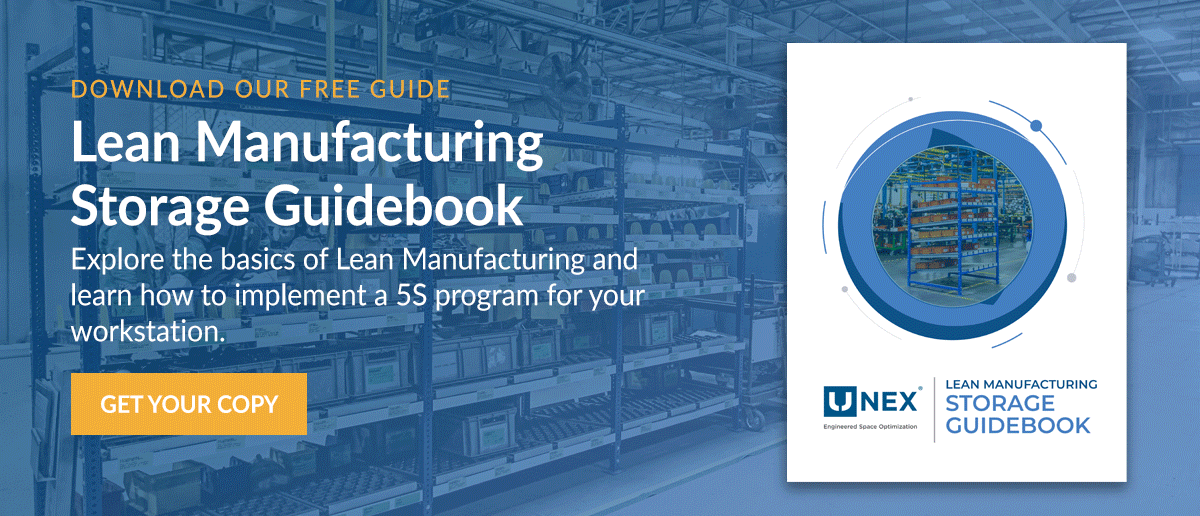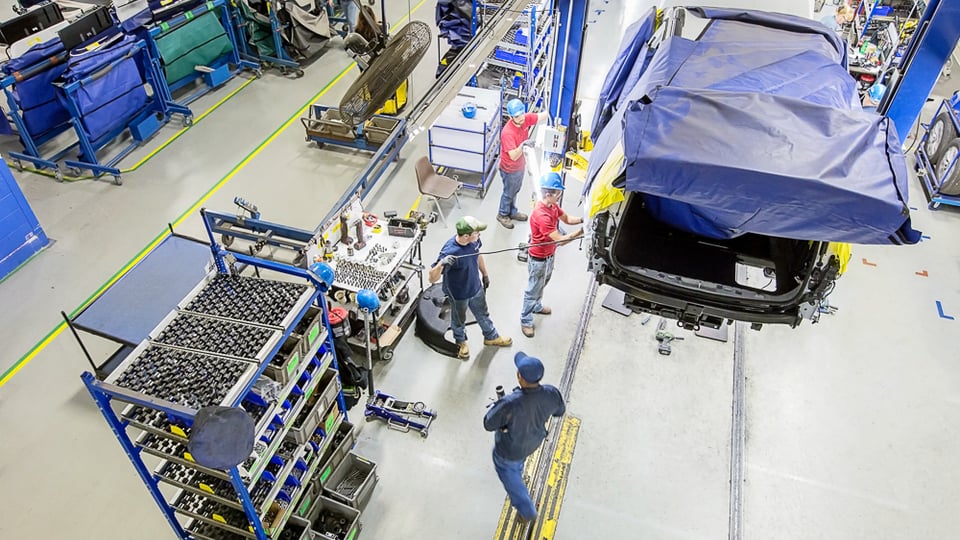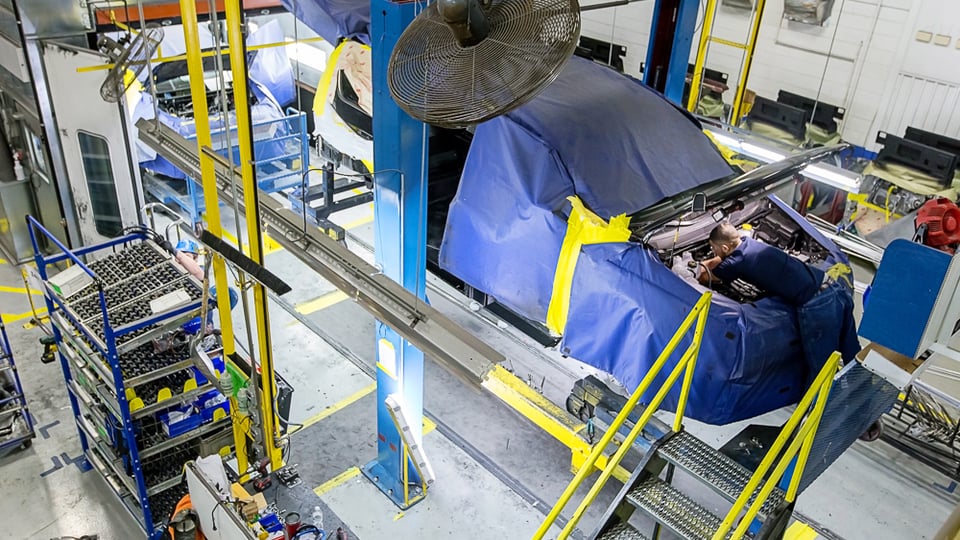Maximizing Space and Reducing Waste with Manufacturing Supermarkets

Manufacturers today are under more pressure than ever. Demand for customization is rising, product mixes are growing more complex, and global supply chains remain unpredictable. At the same time, organizations are expected to reduce costs, increase throughput, and maximize efficiency, all without adding more square footage to their facilities.
For many manufacturers, the solution lies in adopting a Lean-inspired strategy: the manufacturing supermarket.
What is a Manufacturing Supermarket?
The concept of the manufacturing supermarket actually has its roots in post-war Japan. In the 1950s, a Toyota delegation traveled to the United States to study mass production. Surprisingly, the inspiration that shaped Lean manufacturing came not from a factory floor, but from a Piggly Wiggly supermarket.
At the grocery store, Toyota engineers noticed shelves being continuously replenished as customers pulled products. The amount of product on the shelf wasn’t determined by the store’s full inventory, it was dictated by demand, with nearby stock rooms providing fast replenishment.
Toyota applied this idea to the factory floor: keep just enough parts in lineside storage to meet demand, while replenishing from a nearby “mini warehouse” or supermarket. This approach eliminated wasteful travel, reduced excess inventory on the line, and enabled a smoother, faster assembly process.
Today, a manufacturing supermarket serves the same purpose. It’s a designated storage area that organizes and stages parts close to the point of use on the assembly line. Much like a grocery store, it arranges materials in a way that makes them easy to locate, access, and replenish. At its core, the supermarket supports Lean and Just-in-Time (JIT) principles, cutting waste and enabling efficient, reliable assembly operations.

Why Supermarkets Matter in Today’s Manufacturing Environment
The concept of manufacturing supermarkets has been around since the early days of Lean manufacturing, but their importance has only grown in today’s environment.
Manufacturers face many of the same challenges such as:
- Facilities often have limited space, with more SKUs to manage but the same constrained footprint.
- Inventory can become disorganized, making it difficult to track and quickly access the right parts.
- Production lines experience costly downtime when materials are missing, misplaced, or delivered late.
- Complex product mixes and frequent model changes add pressure to already stretched assembly processes.
- Workers face ergonomic strain when they are forced to bend, reach, or walk long distances just to retrieve parts.
Without an organized storage and staging system, these problems quickly erode efficiency and profitability. Manufacturing supermarkets address these issues by improving visibility, organization, and accessibility, creating a stable foundation for Lean operations.
Learn how UNEX carton flow racks help Daimler maximize storage space. Download the Case Study.

Key Benefits of Manufacturing Supermarkets
When designed effectively, manufacturing supermarkets deliver far more than organized storage. They become a critical enabler of Lean operations, helping manufacturers reduce waste, improve throughput, and create a safer, more adaptable workplace. The benefits extend across efficiency, space utilization, inventory control, and worker well-being, making manufacturing supermarkets a cornerstone of today's manufacturing production strategy.
Improved Efficiency & Accuracy
Manufacturing supermarkets streamline the flow of materials, ensuring assembly teams always have what they need. Organized staging reduces downtime, mis-picks, and bottlenecks.
Space Optimization
By consolidating inventory into compact, flow-based systems, manufacturers can increase storage density without expanding their footprint. Solutions like flow racks and carton flow racks can increase space utilization by up to 50%.
Flexibility for Changeovers
As product mixes grow, flexibility becomes critical. Supermarkets designed with modular systems can be reconfigured quickly to support new workflows, model changes, or SKU introductions.
Ergonomics & Safety
Angled racks and adjustable flow racks position materials within easy reach, reducing strain and minimizing injury risk. By keeping walk paths clear and inventory properly staged, manufacturing supermarkets also enhance worker safety.
Best Practices for Building Effective Manufacturing Supermarkets
 To maximize impact, a manufacturing supermarket should be designed with both efficiency and flexibility in mind. Inventory needs to be kept as close to the point of use as possible to reduce unnecessary travel time and keep assembly lines moving smoothly. Modular flow racks are particularly valuable because they can be reconfigured as operations evolve, making it easier to adapt to new product mixes or process changes.
To maximize impact, a manufacturing supermarket should be designed with both efficiency and flexibility in mind. Inventory needs to be kept as close to the point of use as possible to reduce unnecessary travel time and keep assembly lines moving smoothly. Modular flow racks are particularly valuable because they can be reconfigured as operations evolve, making it easier to adapt to new product mixes or process changes.
Ergonomics should also be a top priority. When parts are angled toward workers and kept within easy reach, operations not only move faster but also reduce the physical strain that leads to injuries and fatigue. Clear visual management plays an equally important role, with labeling systems and organized lanes that improve accuracy and eliminate wasted time searching for parts.
Finally, replenishment should be seamless. The most effective manufacturing supermarkets allow materials to be restocked from the back without interrupting the work happening at the front, ensuring a continuous, uninterrupted flow.
UNEX Solutions for Manufacturing Supermarkets
Creating an effective manufacturing supermarket requires more than just shelving. It requires systems that maximize space, improve flow, and adapt to changing needs. UNEX offers solutions designed specifically to support Lean initiatives in manufacturing environments. Each solution plays a unique role in building a manufacturing supermarket that keeps materials organized, accessible, and always moving.
 FlowCell Modular Flow Racks
FlowCell Modular Flow Racks
FlowCell modular flow racks provide the framework for many manufacturing supermarkets. Its modular design allows facilities to configure supermarket storage that supports Lean and Just-in-Time practices. By presenting parts at an ergonomic pick point and keeping inventory organized, FlowCell helps manufacturers use up to 50% less space while boosting productivity by as much as 30%.
 Roller Rack Gravity Flow Racks
Roller Rack Gravity Flow Racks
When a supermarket needs a quick-to-deploy, heavy-duty solution, Roller Rack gravity flow racks offer pre-engineered carton flow in a standalone structure. These racks speed pick rates, free up floor space for more SKUs, and keep parts replenished from the back without disrupting picks in front, making them a natural fit for dense supermarket staging.
 SpanTrack Carton Flow Racks
SpanTrack Carton Flow Racks
SpanTrack carton flow racks is the flexible backbone that turns existing pallet racks into high-performance carton flow systems. In manufacturing supermarkets, SpanTrack ensures FIFO rotation, smooth product flow, and reliable part presentation right at the pick face. This allows teams to replenish easily from the rear while keeping workers efficient and safe at the front.
Together, these solutions create manufacturing supermarkets that are space-efficient, worker-friendly, and built to keep production lines running at peak performance.
Turning Supermarkets into a Lean Advantage
Manufacturing supermarkets are more than just storage areas, they are strategic tools that drive Lean transformation, improve accuracy, and maximize space. In an era of tight margins, supply chain volatility, and growing product complexity, supermarkets enable manufacturers to adapt quickly while maintaining operational excellence.
UNEX manufacturing supermarket solutions, from FlowCell to Roller Rack and SpanTrack, give manufacturers the tools they need to create efficient, flexible, and scalable supermarkets that keep processes flowing. Ready to build your own manufacturing supermarket? Contact UNEX today and speak with our team about the right solution for your facility.



